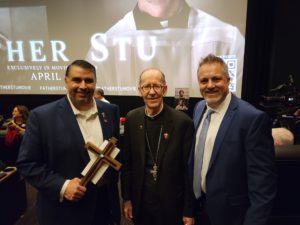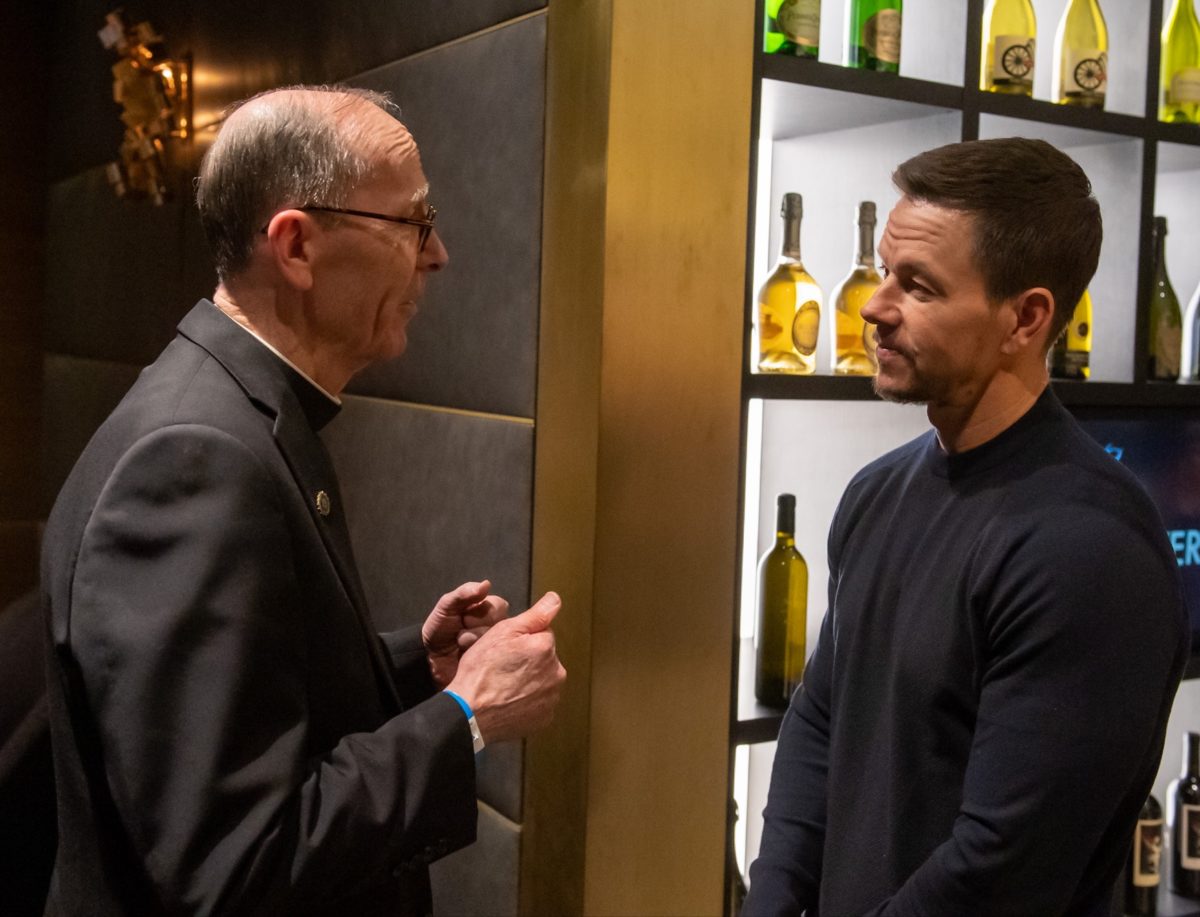By Tony Gutiérrez, The Catholic Sun
Every time Mark Wahlberg’s Stuart Long fumbled through the nuances of being Catholic on the big screen, a theater full of Catholics laughed uproariously. The audience was touched by more serious moments in Wahlberg’s biopic “Father Stu” during a premiere of the film at the Harkins Camelview at Scottsdale Fashion Square April 8.
Sony Pictures organized the premiere for Catholics from throughout the Diocese of Phoenix. In opening remarks prior to the screening, Bishop Thomas J. Olmsted noted that the event was providentially occurring just before Holy Week, correlating the violence of the Passion with some of the more raw and violent scenes in the film, which tells the story of the conversion of Stuart Long from atheist boxer and actor to Catholic priest who suffered from inclusion body myositis, a muscular degenerative disease that eventually took his life in 2014.
“This is the time above all when we remember how the world was redeemed and how that happened, especially by the conversion of hearts, by Christ being able to really turn our lives around. In that, we will also see some very violent scenes,” Bishop Olmsted said, noting the real-live conversion of the film’s titular character. “This movie tonight will have some parts in it — which is why it’s rated ‘R’ — those are there because of the need to have charity and truth.”

The bishop also presented Wahlberg, who was present at the beginning of the screening, with the diocese’s missionary cross, noting Pope Francis’ call for all Catholics to be missionaries.
“What we have in Mark Wahlberg is an example of someone who knows that you can be a missionary, and there’s a need for missionaries who are working in the movie industry,” the bishop said.
“Stu was — when he decided his calling was to serve God — an immovable object, and he’s challenging me every day to do more,” Wahlberg told the audience. “So, please, continue to do your part, and I will continue to do mine. I do feel like I’m reborn after making this movie.”
After the film, Luke Power, a second-year seminarian at Nazareth House Seminary, said that while he’s not normally a fan of religious films because they tend to be “cheesy,” he appreciated the realness of “Father Stu.”
“It’s not a happy little life for Father Stuart. There’s real suffering, loss, grief, and even through that, we just saw how his faith just continued to get deeper the more he was suffering as he was uniting himself with Christ,” reflected Power, who is originally from St. Maria Goretti Parish in Scottsdale.
Jared Cutshaw, another second-year seminarian at Nazareth House, said he could relate to Father Stu’s questioning God after his diagnosis. Being originally from Immaculate Conception Parish in Cottonwood, he can also relate to the character’s rural upbringing in Helena, Montana.
“I thought it captured the human aspects of seminary pretty well,” said Cutshaw. “I found myself kneeling in chapel and asking for answers, too, wondering, ‘Why did you bring me all the way here?’ and those real intimate moments that you have with God when you’re by yourself in the dark.”
One scene saw Wahlberg’s character as a seminarian enter a prison and reach the inmates by speaking to them directly. In the film, Father Stu had also been arrested multiple times.
“That’s how it is a little bit,” reflected Kevin Starrs, director of the Office of Prison Ministry for the Diocese of Phoenix. “You have to be real, raw with it. We need more guys like that [in prison ministry].”
Shea Roberts, a student at Arizona State University in Tempe who attends All Saints Newman Center serving the university, was moved by scene that saw the beginning of a conversion process for Father Stu’s parents. In real life, his parents were baptized in the Catholic Church the Easter Vigil before he died. In the scene, Stu’s father attends an Alcoholics Anonymous meeting with a rosary in his hand and says, “My son wants me to be baptized,” and is shown dancing with his previously estranged wife afterwards.
“It really showed a wholesome connection between the family,” reflected Roberts. “It showed that God can give you grace, even if you do something wrong,” she added, noting the grace that flowed through the characters.
Roberts was also moved by some footage of an interview the real Father Stu did for the Montana Catholic in 2011 that was shown during the credits.
“Hearing from him was just beautiful,” she said.
Sophia Cartwright, another ASU student from All Saints Newman Center, reflected on the film’s message about suffering.
“It’s really easy to get caught up in the dredges of being here,” she said. “How important it is to remember how good everything can be, fixating on things beyond this while still participating in this world.”
Father Daniel Cruz, parochial vicar of St. Mary’s Parish in Chandler, noted the necessity of the film’s “R” rating, as it shows the reality of the human condition.
“It speaks to humanity and the human condition, the fallenness and our sinfulness. I would just highly recommend this movie to anyone who just wants to hear a story of a man who has been redeemed and given a path to holiness, and it was the path of the priesthood, and that was his particular way,” said Father Cruz.
Both the character and real life figure of Father Stu serve as an inspiration for Father Cruz in his own vocation, he said.
“The way he would speak, you can’t just make that stuff up. He had to have really experienced that and come close to the cross and keep it close,” he said. “That was his Calvary, those steps. It’s a great way of entering into Holy Week in a perfect, beautiful way.”
The diocese’s Office Mission Advancement helped organize the audience for the screening, said Candé de Leon, the office’s executive director.
“It tells a story about embracing suffering and then allowing God’s grace to work through you,” reflected de Leon. “Everybody’s got a story. Everybody is broken. Some of us hide it better than others, but we’re all suffering, and we’re broken in some way.
It’s an intentional choice to — rather than reject and complain — see it as an opportunity to get closer to Christ. It was a good reminder about how God is working through every one of our lives.”







